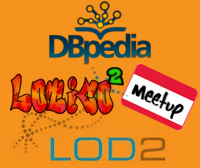
Session, THU 13:30 - 15:00
Knowledge Discovery & Intelligent Search I
Exploring topics through different perspectives with DBpedia
A promising scenario for combining linked data and search is exploratory search. During exploratory search, the search objective is ill-defined, favorable to discovery. A common limit of the existing linked data based exploratory search systems is that they constrain the exploration through single results selection and ranking schemes. The users can not influence the results to reveal specic aspects of knowledge that interest them.
The models and algorithms we propose unveil such knowledge nuances by allowing the exploration of topics through several perspectives. The users adjust important computation parameters through three operations that help retrieving desired exploration perspectives: specification of interest criteria about the topic explored, controlled randomness injection to reveal unexpected knowledge and choice of the processed knowledge source(s).
This paper describes the corresponding models, algorithms and the Discovery Hub implementation. It focuses on the three mentioned perspective-operations and their evaluations.
Nicolas Marie, Fabien Gandon, Alain Giboin and Emilie Palagi
Alcatel Lucent Bell Labs/INRIA Sophia Antipolis
A Comparison of Supervised Learning Classifiers for Link Discovery
The detection of links between resources is intrinsic to the vision of the Linked Data Web. Due to the mere size of current knowledge bases, this task is commonly addressed by using tools. In particular, manifold link discovery frameworks have been developed. These frameworks implement several different machine-learning approaches to discovering links. In this paper, we investigate which of the commonly used supervised machine-learning classifiers performs best on the link discovery task.
To this end, we first present our evaluation pipeline. Then, we compare ten different approaches on three artificial and three real-world benchmark data sets. The classification outcomes are subsequently compared with several state-of-the-art frameworks. Our results suggest that while several algorithms perform well, multilayer perceptrons perform best on average. Moreover, logistic regression seems best suited for noisy data.
Tommaso Soru and Axel-Cyrille Ngonga Ngomo
Ein Text! Sie können ihn mit Inhalt füllen, verschieben, kopieren oder löschen.
Towards an Open Question Answering Architecture
Billions of facts pertaining to a multitude of domains are now available on the Web as RDF data. However, accessing this data is still a difficult endeavour for non-expert users. In order to meliorate the access to this data, approaches imposing minimal hurdles to their users are required. Although many question answering systems over Linked Data have being proposed, retrieving the desired data is still significantly challenging. In addition, developing and evaluating question answering systems remains a very complex task.
To overcome these obstacles, we present a modular and extensible open-source question answering framework. We demonstrate how the framework can be used by integrating two state-of-the-art question answering systems. As a result our evaluation shows that overall better results can be achieved by the use of combination rather than individual stand-alone versions.
Edgard Marx, Ricardo Usbeck, Axel-Cyrille Ngonga Ngomo, Konrad Höffner, Jens Lehmann and Sören Auer
Ein Text! Sie können ihn mit Inhalt füllen, verschieben, kopieren oder löschen.
POSTER: The Organiser - A Semantic Desktop Agent based on NEPOMUK
In this paper we introduce our NEPOMUK-based Semantic Desktop for the Windows platform. It uniquely features an integrative user interface concept which allows a user to focus on personal information management while relying on the Property Projection agent for semi-automated file management.
Sebastian Faubel and Moritz Eberl
Semiodesk GbR
POSTER:
Openplexus: Distributed Knowledge-Sharing in Virtual Teams
In this paper we describe a new distributed knowledge sharing framework that supports knowledge discovery and context-aware knowledge sharing in virtual teams by introducing a 3-tier knowledge sharing architecture. The three layers reflect different facets of knowledge: the personal knowledge that might only have a relevant meaning for its author, the shared vocabulary and experience-based knowledge of teams and the persistent knowledge of the organisational memory. The prototype was designed by following a user-centred design approach in which the involved users gave important insight for the definition of relevant use cases and scenarios that describe common tasks in virtual teams.
Robert Giacinto and Ana Maria Lara Palma
Fachhochschule Köln, University of Burgos


